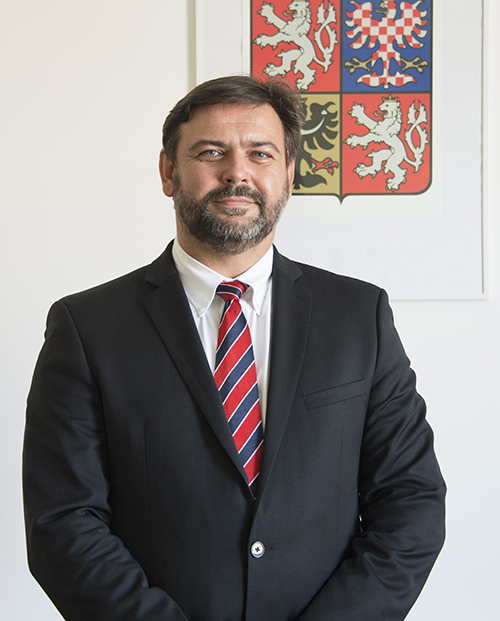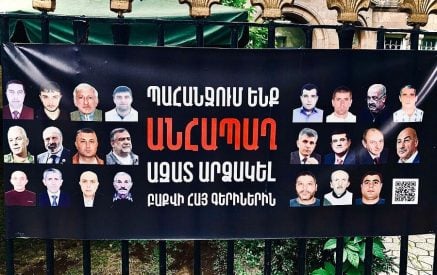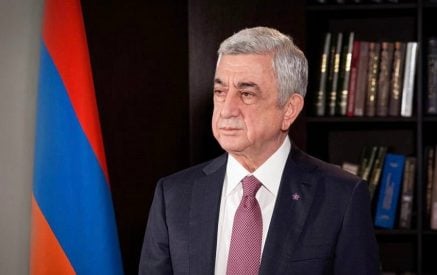“Aravot’s” exclusive interview with the Ambassador Extraordinary and Plenipotentiary of the Czech Republic to Armenia Petr Mikiska
– Mr. Ambassador, recently President of the Czech Republic Miloš Zeman visited Armenia on a state visit, which resulted in having high-level bilateral talks. What agreements were reached during the visit of the President and what results are expected by the Czech side?
– Main goal of President Miloš Zeman’s visit was to enhance our bilateral economic relations. In this regard, no new bilateral agreements were expected, as the legal framework for trade and investments and conditions for its development are prepared, with the exception of the Investment Promotion and Protection Agreement, which provisions are discussed in the framework of more general EU – Armenia agreement. What we need at this moment is to convince both Czech and Armenian business people to establish new ties or deepen those already existing. And this was the goal of President Zeman, bringing with him a large group of Czech entrepreneurs and participating, together with President Sargsyan, at the business forum in Yerevan.
– President Zeman announced in Yerevan that after returning to his country, he intends to apply to the parliament with a call to recognize the Armenian Genocide. What do you think will the decision made by the German Bundestag be an example for other countries? And then. Germany acts in support to the establishment of a dialogue between Armenia and Turkey. Do you see such a possibility at this stage?
Read also
– President Zeman’s call was already addressed in Czech Parliament’s Chamber of Deputies, where corresponding resolution project has been presented. Due to procedural difficulties, the project was not voted at that time, but it is expected to reappear on the agenda of the Chamber soon. I think that Czech deputies will, among others, take into account the recent flash poll in Czech media, where more than 96% of participants demand the recognition of Armenian genocide by the Chamber of Deputies.
German Bundestag’s resolution will certainly influence institutions of other countries in their evaluation of tragic events of 1915, not only because of Germany’s political and economic importance, but also because of the recognition of its role and complicity in Armenian nation’s calvary.
It is not only Germany calling for dialogue between Armenia and Turkey. I dare to say that all European countries, maybe with one exception, genuinely wish correct and friendly relations between Armenia and Turkey. Whether it is possible or not, given today’s circumstances, is not a question for me but for leaders and citizens of both countries.
– There is a tension in the relations between Russia and Turkey, Turkey supports Azerbaijan in the Nagorno-Karabakh conflict. What do you think are these factors an obstacle to the normalization of Armenia-Turkey relations?
– Relations between Turkey and Azerbaijan, among others, already influenced the outcome of 2009 Armenia – Turkey negotiations and the faith of Zurich protocols. That time Turkish Prime Minister Recep Tayyip Erdoğan announced multiple times, that the Turkish ratification depended on a peace deal in Nagorno-Karabakh conflict. I didn’t register any change in Turkish position since then. Regional situation obviously plays and will play its role in Turkish – Armenian settlement.
– Mr. Ambassador, we would like you to assess the dynamics of the development of bilateral relations between Armenia and Czech. In recent years, several Armenia and Czech business conducted conferences which indicates the existing mutual interest. Do Czech and Armenia duly benefit from the expansion of cooperation in economic, industrial and trade sectors?
– Both President Zeman and President Sargsyan mentioned during the press conference in Yerevan that our potential in economic cooperation is not fully used. This assumption is on one side valid because the Armenian export offer, despite the favorable conditions and zero customs tariffs created by the GSP+ scheme, is not very large. On the other hand, Czech exports are mainly based on technologies and industrial means and with the exception of energy sector, due to the state of industrial production in Armenia, they find their consumers with some difficulty. We hope that the demonopolisation and development of small and medium enterprise in Armenia will bring more economic activity, more production and exports from Armenia, and more demand for industrial goods.
– What is the level of the Armenian-Czech cooperation in military and security sectors? The Czech Republic was traditionally known for its defense industries, Armenia also has extensive experience in the production of defense technology. What place does the cooperation in these sectors take on the agenda of Armenia and Czech relations?
– Ministries of Defence of both countries concluded an agreement on military cooperation in 2010, resulting especially in educational exchange and exchange of information. There is an intensive cooperation within the NATO – Armenia cooperation framework, for example in scientific projects. Mr. Seyran Ohanyan, Minister of Defence of Armenia, visited Czech Republic in October last year, his counterpart, Czech Minister Martin Stropnický, is expected to visit Yerevan later this year. These contacts opened the possibility of conclusion of another agreement, on military technical cooperation, currently in process of negotiations. But we must be frank and not to give space to unfounded hopes or fears – Czech Republic, like the vast majority of OSCE participating states, is fully committed to OSCE appeal of 1992 not to supply arms and weapons to the sides of the Nagorno Karabakh conflict. Unfortunately, not all OSCE participating states behave the same way, thus allowing escalations of violence and human losses on the line of contact between Nagorno Karabakh and Azerbaijan or on Armenia – Azerbaijan border. The justifications that “other countries” would supply the arms to the parts of conflict or “just business” are simply an excuse for instigating the hot phase of the conflict.
– Armenia is a member of the Eurasian Economic Union, however, our country is taking steps to bring the EU relations to a new level. What do you think is Armenia successful in running a balanced policy between Russia and the West given the current crisis in the relations?
– European Union, since times of EU – Armenia Partnership and Cooperation Agreement of 1999, is offering to Yerevan full-fledged cooperation aiming, among others, at the political stability, development of democracy and rule of law, protection of human rights and economic prosperity of Armenia. Current negotiations on new legal framework for this cooperation are part of the offer. At the same time we shouldn´t forget that conditions for trade were already unilaterally improved for Armenian exports by the EU GSP+ scheme, allowing to vast majority of Armenian goods to access the European market with zero duties.
This is our offer, in my opinion very generous, taking into account that European goods enter Armenian market with high, protectionist Eurasian Economic Union tariffs. How this opportunity, as well as the opportunities in other fields, is used will depend on Armenian leadership.
And whether Armenia is leading and will lead a balanced policy… You should better ask the Government of Armenia about its determination, and Kremlin about its mood.
– Armenia’s authorities often speak about the fact that Armenia can become a linking bridge, having free movement of goods, labor force, finances and Customs Union, on the other hand, having preferential trade conditions with the EU member countries. Do you see the application of such opportunities?
– At the first sight this possibility looks very attractive. However, for example for the trade of goods, even preferential regime of GSP+ has its limits. Goods, let´s say from Russia or Kazakhstan, can´t be exported to the EU via Armenia as Armenian products so they can´t benefit from EU preferential regime. And on the other side, European goods can´t be exported to Russia or Kazakhstan via Armenia benefiting from the Eurasian Economic Union freedom of movement of goods – duties must be paid on Armenian borders anyway. So why to bring European goods to Armenia and further to Kazakhstan or Russia, with high transportation and logistics costs, if these goods can be exported to Russia or Kazakhstan via Belarus or directly to Russia with substantially lower costs?
There is a different situation in the sphere of investment: an investment project in Armenia realizing its production on the EEU market can be potentially successful – but it must stand the logistics costs. This uncertainty means that investors are rather cautious, at least as far as I know. We hope that Armenian authorities give us more detailed vision of this connecting bridge idea.
– As a result of the war unleashed by Azerbaijan in April, the theme of the Karabakh conflict settlement escalated. Today, the attention of the international community is focused on this conflict. Armenia and Nagorno-Karabakh also accuse the international community of turning the blind eye to Azerbaijan’s militaristic policy for years, of putting a sign of equality between Armenia and Azerbaijan, and of making balanced statement. What would you say in this respect?
– The Nagorno Karabakh conflict must be solved by peaceful means, there is absolutely no doubt about it. Peaceful solution means a dialogue, a negotiation, and for dialogue you need to have two sides. News from the line of contact are always similar on both sides, Armenia – Nagorno Karabakh blaming Azerbaijan and vice versa. There is no real and objective monitoring along the line of contact or international border and international community is offered two national versions. No Embassy in Yerevan or Baku knows for sure which one is true and has no means to verify them. In this situation, how can be the international community asked to take sides, given the lack of unbiased information? The result of a strong international statement and accusation of initiating the military action would be the rejection of any international involvement by the other party, which would impede any negotiated solution and make the risk of war even higher. I understand the indignation of Armenian government and Armenian people, as there seems to be no motivation for cease of fire violations from Armenian sides, but if you want to have a negotiated solution, you must keep the communication channels opened on both sides. However, that doesn´t mean that sides can have a total freedom in their military actions, believing that no one would dare to criticize them. We hope, that the ceasefire violations investigation mechanism, offered by the OSCE Minsk Group co-chairs and supported by participating states, will be adopted and implemented as soon as possible.
– How do you assess Russia’s policy in our region?
– Negatively.
– After lifting of the sanctions against Iran, the role and influence of Armenia’s neighbor substantially increased both in our region and in the world. What is the significance of Iran today in the light of stability in the South Caucasus?
– It’s good to have Iran back in international community, Iran certainly will play a significant role in South Caucasus. It´s too early to evaluate it, but by my humble opinion future development will depend whether in its approach economic or strategic/military reasoning would prevail. We can have a cooperation or confrontation scenario with Russia, we can observe growing will to address the Nagorno Karabakh conflict, we will follow the development of its communications with the region, being it roads, railroads, high-voltage transmission lines or pipelines, via Armenia or Azerbaijan, etc.. Although it´s premature to judge, I am worried that Iran´s influence in the region will not necessarily be completely positive for Armenia.
Emma GABRIELYAN
Photo by Tatev Mnatsakanyan






















































